
Kristina Anthony is a drain service technician for San Diego-based Anderson Plumbing, Heating & Air.
Women excel in plumbing
These ladies have already shattered the glass ceiling, now they’re recruiting others do the same.
Sorry James Brown, but this is no longer a “Man’s World.” Today, women work in just about every field and industry, proving they can do just about anything a man can do. U.S. Census statistics show more and more women have been entering previously considered male-dominated industries, including construction.
However, though women make up nearly half of the U.S. workforce, only 2.1% are plumbers, pipefitters and steamfitters, according to the U.S. Department of Labor’s Bureau of Labor Statistics as of January 2022.
The skilled trades — including plumbing and HVAC — can offer women a great career path with equal pay, room to advance, and in return, women can help fill the need for workers during a time when most industries in the U.S. are experiencing labor shortages. The problem is most women have never seen a woman plumber or HVAC technician, and therefore don’t see it as a career path for themselves.
The industry is working on changing that. Plumbing & Mechanical sat down with several women contractors to discuss women in plumbing and how to recruit more women into the field.
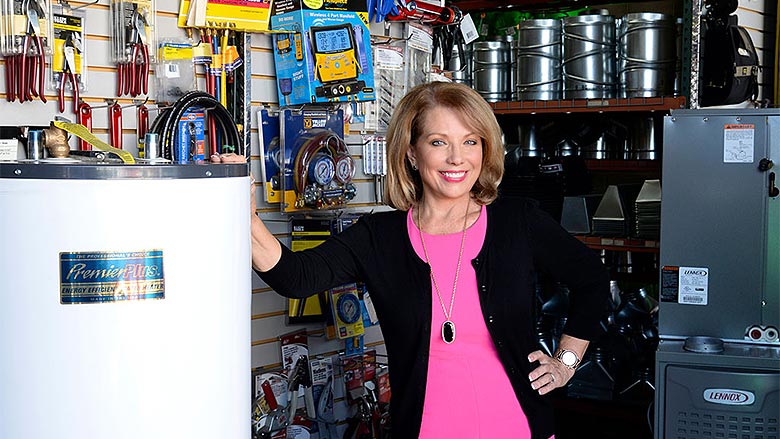
The pink plumber
When you talk about women-owned contracting companies, Mary Jean Anderson’s name always comes up. Anderson is president and CEO of San Diego-based Anderson Plumbing, Heating & Air, a company she purchased from her ex-husband after they had a difference of opinion on whether to focus on new construction or residential service, repair and replacement. That was back in 2004. Anderson decided to capitalize on being a woman-owned contracting business, and rebranded by adding hot pink to the company logo, fleet vehicles and uniforms. In 2007, she decided to tack on HVAC services to the company’s offerings. Today, the company boasts 240 employees, 150 fleet vehicles and earned a little more than $50 million in revenue in 2021.
“When you’re in high school, they give you those career path assessment tests, well, I was a helper,” Anderson says. “My parents talked me into going into nursing. I love to help people. But I came into this company to help my then-husband, who was really struggling. But I came to really love the industry. My father was blue collar, and growing up, I realized he probably had some kind of learning disorder, but he was very mechanical. So, while everybody went to college and ran companies, my father was a mechanic and then a commercial fisherman. I always felt like he was looked down on, that he was the black sheep. I realized as soon as I got involved in the plumbing industry that these men are very smart, but they didn’t know it, didn’t believe in it.
“And it sounds corny to say we’re responsible for the health of a nation, but we are,” she continues. “A lot of the diseases like SARS, for instance, are caused by poor water and sanitation because of their plumbing systems. Back in the day, plumbers were more important than doctors when they were building all the aqueducts because they were responsible for public health. The doctors were secondary below them. Somehow this industry changed into a butt crack joke. The way plumbing is portrayed in the movies “Moonstruck” and “Home Alone” infuriated me. I worked really hard to get our industry and the people I work with to be proud of themselves, wear a professional uniform and be spotless and immaculate in everything they do. I fell in love with this culture, and in a way, maybe it was an homage to my dad. I want to elevate this industry.”
Then, in 2016, Anderson heard a statistic from Plumbing-Heating-Cooling Contractors — National Association, that the skilled trades were aging out at 10% per year, and only 6% were entering the industry.
“I thought, ‘OK, this is a crisis,’” she says. “I didn’t want to steal employees from other people, but I had to grow my company. Originally, back before I turned everything pink and female-owned, I had a Rosie the Riveter framed poster in my office. So I thought to myself, what happened during World War II? Women put on their pants and went to work — that’s what started women working. Then I thought women are going to be part of the answer, so we had to look at women.”
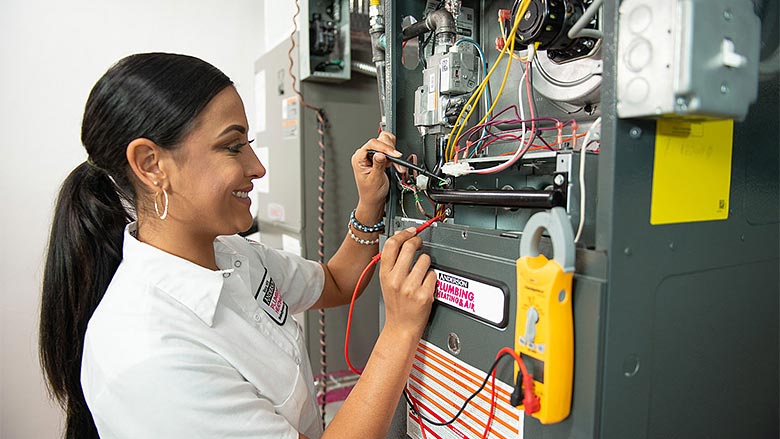
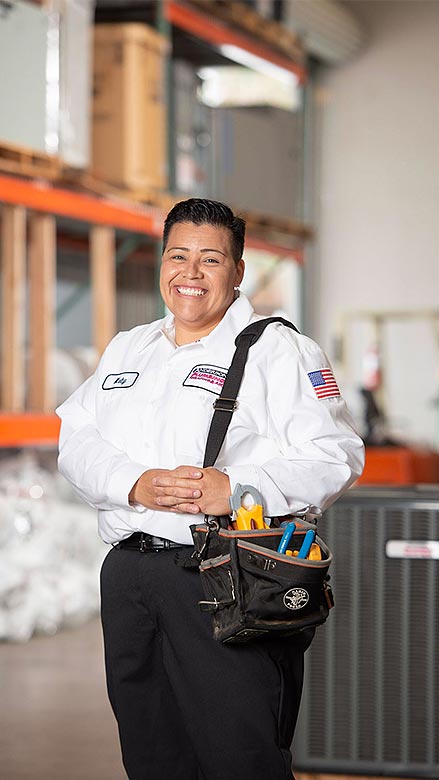
Katy Frausto is an HVAC senior service technician for Anderson Plumbing, Heating & Air.
Anderson thought about that for about a year then started her own school in 2017, Anderson Career Builders Institute (ACBI) to help train people for the industry, especially women. Anderson’s husband, Bryan Rominger, a master plumber and NATE-certified HVAC technician, is the dean of the school and helps build the different curriculums. He also teaches full-time along with one other teacher. Anderson is currently looking to add a third to the school’s staff.
“I got the idea from my daughter — my first two women in the field were my daughter and another gal, Randy Green, who is still with me today as a service manager,” Anderson says. “They did really well, and my daughter during the eighth month of her pregnancy had a 100% closing average with an average ticket of $8,800. I’m really on a crusade to get women.
We’re missing the boat because this job is not what it used to be. We’re not running a cable and then digging tons of trenches to try to find the break in the pipe. You put a camera down the pipe now. There are apparatuses to help you lift a water heater into place. Women can do this job, and they do it really well, I promise you.”
Anderson Plumbing, Heating & Air currently has 12 women employees in the field.
“They are by far some of the top producers in the country, not just in our company, but in the country,” Anderson notes. Anderson is able to compare her employees to other contractors around the country thanks to her membership with contractor organizations like Nexstar Network and TurnPoint.
“I began making sure my employees understood the woman was going to be the decision-maker in most cases, and they really needed to know how to communicate with women, where to keep their eyes, how to bring them into the conversation and so on.” – MARY JEAN ANDERSON
“We’re close to the Mexican border, and if you think about the Spanish word for home, “La Casa,” it’s female — the home is female. So when a woman goes into the home, they are able to connect with the women decision-makers. Back in the early 2000s, I did an unofficial study when I was taking all the checks into the bank. Over a span of three months, 78% of the people signing the checks were women. That’s how this whole revolution started. I began making sure my employees understood the woman was going to be the decision-maker in most cases, and they really needed to know how to communicate with women, where to keep their eyes, how to bring them into the conversation and so on.”
Anderson notes that she recruits women from all walks of life everywhere she goes. She has found women trainees through mutual acquaintances, women’s shelters, in the gay and lesbian community, the military and more.
“I talk about it wherever I go, whether I’m at the hairdresser, the manicurist or the doctor’s office,” Anderson says. “My first gal was from my dad’s rehabilitation center, so you never know where you’re going to find them — so you have to keep talking about it.”
Anderson’s next step is working on short two-minute video clips with her female employees discussing the benefits of being in the industry.
“I can promise you the only problem is that people don’t think about it,” she says. “It has to become top-of-mind awareness that this is an industry where women can work and succeed — and it’s equal pay. There’s no discrimination when it comes to pay. What I have found, and what I want this industry to know, is that yes, the women work harder than a man — they have to because they have to prove themselves. Once you find them, they’re completely committed, devoted and very hard workers. We do have to accommodate their schedules (with children) to a certain degree, because still in our society, it’s not totally equal. There’s no better joy in my life than watching women succeed in this industry and creating a life for themselves without having to depend on anybody.”
All roads lead to plumbing
Beth Rovazzini, president of Indianapolis-based B&W Plumbing and Heating and a member of PHCC of Indiana, never planned to run the family plumbing and heating business, but fate had other ideas. She actually started her career as an accountant.
“My Barbie never installed toilets or furnaces,” Rovazzini notes. “I went to school, got a degree in accounting and actually went to work for a Big Eight accounting firm. Then, my brother passed away, which kind of changed the dynamics. There was just the four of us. My parents had purchased a restaurant when he died just to have something to distract them. I actually hated being in accounting, so I came over and ran the restaurant for about five years until we sold it. After that, I came to run the financial side of B&W. Then, one day, my parents told me their retirement plan was for me to purchase the business, so I did with three other partners.”
Rovazzini says she has never experienced any discomfort or hard times working in a male-dominated industry. “It’s not like how they portray it in the movies. There are sometimes awkward moments, but a lot of it is just confidence in yourself and really doing the right thing. You have to have the confidence — when you walk into a job trailer and there are 40 guys in there, and you’re the only woman, it goes dead silent. If you let that get to you, it could be a problem. But if you just say, ‘OK, are we doing this meeting or not, guys?’ If you’re comfortable, everyone around you will be comfortable.
Rovazzini notes there have been times when job site foremen and superintendents would tell her they thought she wouldn’t know what she was talking about or that she would be hard to work with, and in all cases, the men were pleasantly surprised.
“There’s a lot of advantages to being a woman,” she notes. “We’re usually better at following through on things. We’re much better at listening, so that tends to make a lot of things go better. And I think the key, too, is knowing what you’re talking about. A lot of times men fake it with bravado, and as a woman, I can’t fake it. I better know what I’m talking about, so I better do my homework. I need to actually know what’s what.”
“In construction, if you’re a licensed plumber and you’re female, you’re going to make the same amount [of money] as your male counterpart. If you can do the job, I don’t care if you are purple. Do the job, and that’s fine with me.” – BETH ROVAZZINI
One of the best things about this industry is people are willing to share their knowledge, Rovazzini explains.“If you’re teachable, no matter what industry you are in, people that are competent want to share their knowledge. I see that all the time with our plumbers and our apprentices. If that apprentice has the right attitude and is like a sponge, our older guys will spend a lot of time and effort teaching them. But if you’ve got an attitude or act like you know everything and there’s nothing for you to learn, then they’re not going to waste their time either.”
Rovazzini says for the most part, there are no physical limitations preventing women from becoming excellent plumbers and HVAC technicians.
“It’s not like you need to be able to lift 400 pounds or anything like that,” she says. “Especially on the service side. Women are more detail-oriented. Most women are better communicators because they listen better. And the pay — that’s one thing about construction. You hear a lot of people in business groups always talking about pay equity and the glass ceiling. You don’t have that in construction. If you can do the job, you’re going to be paid the same thing. It’s not where if you’re the executive director of an organization and you’re a woman, yeah, you’re probably going to be paid 20% less than if they gave that job to a man. That’s just how it is. It’s not right, but that’s how it is. But in construction, if you’re a licensed plumber and you’re female, you’re going to make the same amount as your male counterpart. If you can do the job, I don’t care if you are purple. Do the job, and that’s fine with me.”
The trades benefit from having more women join as well, Rovazzini notes, because there is a larger job pool.
“What’s really happened to us is everybody is recruiting out of the same young male pool,” she says. “Well, young men today have so many other options. I mean, you can actually make a living playing video games these days. 50 years ago, there were not this many options — you went to work at a factory, worked on the farm, got a white collar job or you went into a trade. Today, there are so many options available to an 18-year-old male, they’re choosing other things. And our pool kept getting smaller and smaller. Expanding our pool to include women doubles our potential workforce.”
While B&W doesn’t have any current women in the field, it has in the past. Rovazzini, like many other contractors, finds it difficult to recruit women because most women don’t see themselves in the position.
“It’s not like Barbie ever had a toolbox — maybe she should,” Rovazzini says. “We need to get out in the middle schools, high schools, adult education centers and in the community. What I see so often with other contractors is they have an immediate need — we all do. But I also know I’m going to need somebody five years from now, 10 years from now. If we don’t keep adding people to the industry, we’re actually devaluing our companies because there won’t be anybody down the road. Then we’re going to have to consolidate because there won’t be enough people to do the work.”
“[Women] traditionally have a strong attention to detail, they’re traditionally tidier — just those two things there make a homeowner more comfortable.” – KAREN HILL
Once you’re in, you can never leave…
Karen Hill, vice president of HM Plumbing in Marietta, Georgia and QSC Advisory Council member, got involved with the company to help her husband. She never planned to stay long-term, but she’s still going strong 14 years later.
“My husband started the company in 2007, and I was a vice president of marketing for a high-rise condominium developer. When the mortgage market crashed in 2008, you couldn’t give away a condo, so I lost my job and I was devastated. So I told my husband, ‘I’m going to help get the company going because I have a business and marketing background. I have the skills and I’m going to help you get it together. But just know, when I get that phone call that I have my high-rise office back, I’m out of here, it’s going to be short-lived.’ That was in 2008, and I’m still here.”
In that 14 years, Hill has learned plumbing as well as obtained her journeyman’s license, and very recently, her master plumbing license. Hill manages everything on the internal operations side of the company from the dispatch team to insurance to payables and receivables to customer service. HM Plumbing has grown to 23 employees, including one female journeyman plumber who serves as an estimator in the office.
“I now have a passion for it,” Hill says about plumbing. “My dad was in aviation mechanics, so that work ethic is the same, you’re working with your hands and there’s a beginning and an end. This is what my husband does and I’m here to support him. I don’t have the desire to go and search for that corporate corner office any longer, it’s not my thing anymore. I’m pretty comfortable where I am, and I’m very involved with PHCC on the local level. I’m hoping to get more involved on a national level to help educate not just children, but parents as well that this is an admirable industry with a great career path.”
According to Hill, the industry can benefit from having more women plumbers and technicians because of their attention to detail.
“Women’s skillsets are different from men, and there’s nothing wrong with that,” she says. “They traditionally have a strong attention to detail, they’re traditionally tidier — just those two things there make a homeowner more comfortable. We need to expose the women that are in the industry to show this is not just a male-dominated business. We’ve already broken the glass ceiling, but it’s the exposure that we — me included — are lacking. We need to be better at exposing that to the public and to colleges and other institutions.”
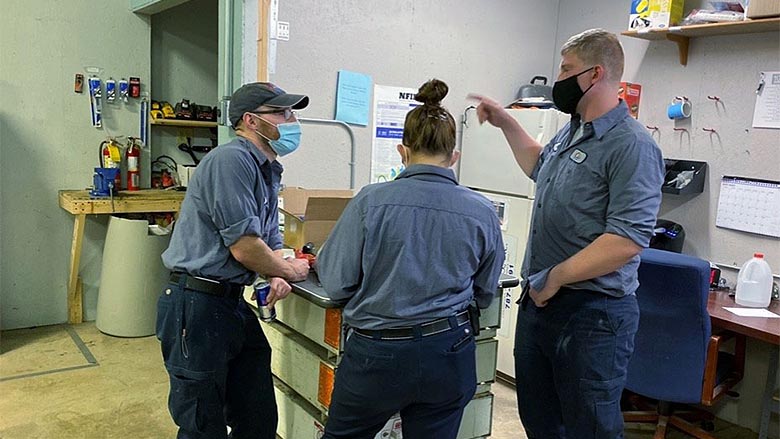
Third-generation going strong
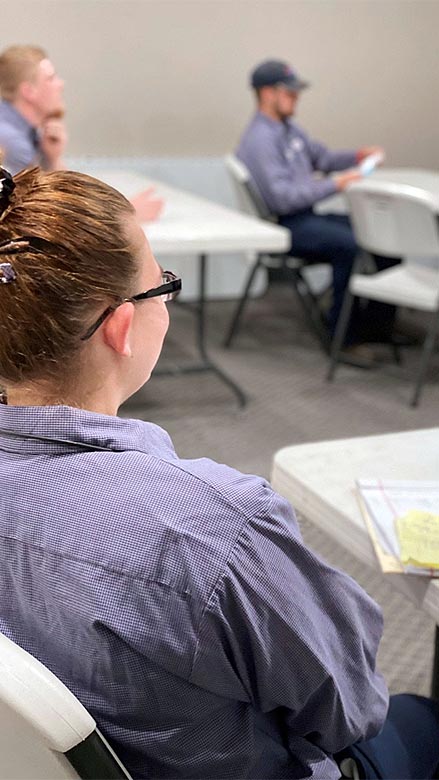 Cassie McCullough is an apprentice plumber with Ciriello Plumbing in Beech Grove, Indiana.
Cassie McCullough is an apprentice plumber with Ciriello Plumbing in Beech Grove, Indiana.“Growing up in a family business, regardless of what the business is, you’re always somewhat involved in it,” Ciriello explains. “I had to wash trucks, sweep floors, answer phones and things like that. I didn’t really think that that was the path that I was going to end up taking. All I knew was I wanted to go into business.
My dad took me to lunch one day, and he asked me, ‘Have you ever considered the family business?’ I said, ‘No, not really.” He said, ‘Well, you’re kind of bossy.’ I was kind of bossy. I loved business. Really, it could have been anything, but I’m proud that it’s plumbing.”
Ciriello holds a plumbing contractor license, which is the highest license in her state. The day she took her test, she was the only woman out of about 200 people testing.
“There was a practical portion and a written portion of the test and they split the group in half,” she says. “I remember sitting in the written portion and there are two proctors of the exam walking around. The proctors said to each other, ‘I hear we have a woman in here today, I wonder where she’s at?’ I was literally right next to them. I had my hair in a ponytail, jeans on and work boots. I guess I was a bit more camouflaged than I thought. It made me laugh. But I aced the test, both the practical and the written. I was probably more determined to ace the test because I wasn’t supposed to, I guess.”
“I think women sell themselves short by not considering something that’s not traditionally thought of for them. There are certain times when she would be the preferred technician, based on how small of a space it is, or the very finite motor skills that women have, inherently, because their hands are smaller. Typically, they’re also better communicators.” – LAURA CIRIELLO
As a business owner, Ciriello knows women can absolutely succeed in plumbing and views them as an untapped employment pool.
“We have a female technician on staff, and she’s doing wonderfully,” Ciriello says. “Unfortunately, we’re still in a day and age where you’re not sure exactly how they’re going to be received. It probably helps that her boss is a woman, too. Every once in a while, she’ll get some pushback, but for the most part, she’s really been embraced. I think it has everything to do with her work ethic. I think women sell themselves short by not considering something that’s not traditionally thought of for them. There are certain times when she would be the preferred technician, based on how small of a space it is, or the very finite motor skills that women have, inherently, because their hands are smaller. Typically, they’re also better communicators.”
Like anything in life, plumbing contractors need to show women that it’s possible to succeed in this industry, Ciriello notes.
“If you can see yourself in it, then you’re going to be more apt to consider it,” she says. “We, as an industry, have to promote the fact that female technicians not only exist, but thrive. Then as contractors and employers, we really need to create an environment where that is encouraged and sought after.
“It’s really not as hard as we think it is,” she adds. “You have to be really open to being different. My female technician is tough, and she would succeed no matter where she was. That kind of drive makes this transitioning into a job that’s not common even easier.”
Photos courtesy of Anderson Plumbing, Heating & Air, B&W Plumbing & Heating, HM Plumbing and Ciriello Plumbing.
